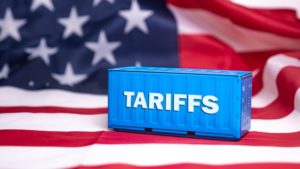Market Update 7th April 2025

Tariff Update
What’s happened
On Thursday evening President Trump made his much-anticipated announcements on the quantum and extent of his administration’s tariff policy. Beforehand, the commentariat’s guess work ranged from a scenario in which Trump would restrict tariffs to “reciprocal” tariffs – i.e. levying them only on countries that impose tariffs on the US, to those who felt he would simply blanket the world (i.e. tariffs on all imports to the US). The actual announcement was very much a negative surprise, with tariffs applying to all trading partners and to a greater extent than most feared.
One of our maxims is to never waste too much time trying to forecast (guess) macroeconomic variables or geopolitical events, nor how financial assets may react to them. Our discipline lies in focussing on what we can control: ensuring portfolios are diversified and can weather all manner of economic climates, identifying cheaply-valued assets accessed via appropriately priced investment products and identifying well run portfolios managed by talented fund managers. As such, we react to this news in the same way we always do: calmly and with discipline.
The headlines of the speech are as follows:
- We have both reciprocal and blanket tariffs. The former vary in magnitude across countries, while there is a blanket 10% tariff on all imports.
- Of significance (in terms of trading partners), from April 9th China is hit with 54% tariffs, the EU 20%, Japan 24%, India 26%, and the UK has escaped relatively lightly with 10%.
- Mexico and Canada avoid new tariffs (i.e. in addition to those already announced)
- Among smaller trading partners, Asian countries have fared worst – especially Vietnam.
- The US effective tariff rate rises to levels not seen since around 1910.
The initial reaction from financial markets has been very negative. US equities fell by nearly 6% on Friday, following a fall of nearly 5% on Thursday. The US dollar has depreciated around 1.7% against sterling. Meanwhile UK equities are outperforming but have still fallen around 6.5% to the end of last week. Tariffs cause prices to increase, and many fear this may increase inflation (and more specifically, inflationary expectations). At the same time, many fear they will dampen economic activity across the globe, but the fears with regard to the US economy are particularly acute given its current weak economic position (being close to a recession). Thus it is no surprise to see bonds stronger (yields lower) this morning, with government bonds with explicit links to inflation performing best.
What happens next
Given many are scratching their heads about how the various tariff levels were even calculated, it is fair to say that Trump’s motivations with these tariffs are hard to rationalise. It could be a negotiating tactic, or could indeed be an attempt to permanently re-shore manufacturing back to the US. How other countries react is also unknown – and governments all over the world will be trying to divine what Trump wants from them in order to secure concessions. The speech itself both suggested that tariffs were permanent, but also left the door open for bilateral deals to be made.
Our Funds’ Positioning
Within equities, we have relatively low exposure to US equities, and what exposure we do have is weighted towards funds that have a more domestic focussed portfolio and less demanding valuation. Instead, our portfolios are exposed to attractively valued companies across the UK, Europe, Asia and Japan which have been left behind in recent years as the weight of global capital has continued to pour into US equities. The typical characteristics of our equity exposure is higher starting dividend yields (offering a solid return foundation), low starting multiples in absolute terms and relative to history which offer downside protection in uncertain market conditions, strong balance sheets (low financial risk), and robust long-term growth potential. Our asset allocation is well positioned to benefit from global investors’ reassessment of the risk profile of the US equity market.
Our fixed income exposure is skewed towards high quality (investment grade rated) credit and government bonds, which should prove defensive during elevated periods of uncertainty and against the backdrop of rising inflation expectations. In addition, this allocation offers attractive yield profiles in absolute terms and relative to passive fixed income offerings which helps underpin long term return expectations.
Our exposure to alternatives offers return profiles that are uncorrelated to equities and fixed income. Our infrastructure and property investments have so far been relatively resilient. Infrastructure provides exposure to assets with low economic sensitivity, inflation-linked contracted revenue with very high-quality counterparties (often government contracts). A potential environment of higher inflation expectations, and lower long term bond yields should be beneficial for these assets. In addition, the investment trusts we use to access these assets are trading at wide discounts relative to history, offering higher starting yields with the prospects of further growth that underpin returns in an uncertain global environment. Our property exposure is UK domestically focused and is insulated from US tariffs. Corporate activity across this part of the portfolio is elevated and set to continue despite macro uncertainty. Boards are starting to move to unlock the value in discounts, with record buybacks, bids, asset sales, and merger activity offering idiosyncratic returns. We also have exposure to gold which continue to perform well as investors seek defensive assets with no counterparty risk.

Ben Conway – Chief Investment Office & Head of Fund Management
Hawksmoor Investment Management Limited is authorised and regulated by the Financial Conduct Authority (www.fca.org.uk) with its registered office at 2nd Floor Stratus House, Emperor Way, Exeter Business Park, Exeter, Devon EX1 3QS. This document does not constitute an offer or invitation to any person in respect of the securities or funds described, nor should its content be interpreted as investment or tax advice for which you should consult your independent financial adviser and or accountant. The information and opinions it contains have been compiled or arrived at from sources believed to be reliable at the time and are given in good faith, but no representation is made as to their accuracy, completeness or correctness. The editorial content is the personal opinion of Ben Conway. Other opinions expressed in this document, whether in general or both on the performance of individual securities and in a wider economic context, represent the views of Hawksmoor at the time of preparation and may be subject to change. Past performance is not a guide to future performance. The value of an investment and any income from it can fall as well as rise as a result of market and currency fluctuations. You may not get back the amount you originally invested. Currency exchange rates may affect the value of investments.
View more news